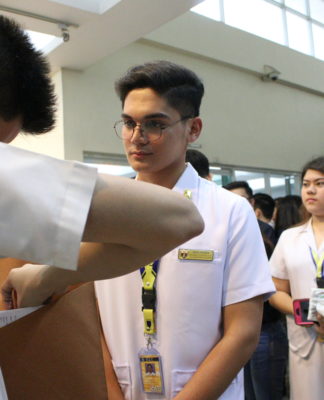THOMASIAN pride is not enough to keep professors from leaving the University–fair college policies and work satisfaction play big roles in encouraging them to stay, a recent study has revealed.
The study titled “When the ‘Arms’ Begin to Speak: University Faculty Assessment of their Development ‘Heads’,” commissioned by the UST Faculty Union, delved on interpersonal working relationships between faculty members with administrators.
The study showed that professors in 11 of 18 academic units in the University have harmonious working relationships with their deans, assistant deans, regents, and college secretaries, based on six variables.
This contributed to the professors’ “pleasure of rendering service,” making them “proud of being a UST professor.”
The six variables were “leader-member exchange” or the interpersonal relationship between the professor and their college administrators; “distributive justice” or recognition and rewards for a good job done; “procedural justice” or the fair implementation of policies; “job satisfaction” or the pleasure of rendering service; “organizational commitment” or, proud feeling of being a Thomasian educator; and “turnover intentions” or the tendency of a professor to leave the University.
Five academic units in the University registered a score lower than 2.0 in turnover intention, indicating the high tendencies of faculty to leave the University.
The five academic units, which were not named, are most likely to suffer a faculty exodus because of low organizational commitment as a result of being dissatisfied with their work, the study showed.
Seven academic units were also found to have low organization commitment.
Dissatisfaction in work may be caused by the unfair implementation of University policies, and incongruent compensation to work done, among other factors, the study said.
The survey had a total of 559 respondents, representing 30 percent of tenured faculty in the University. UST elementary and high school teachers, and employees of the Miguel de Benavides Library were also surveyed, while the Faculty of Civil Law and the UST Graduate School did not take part in the study.
Administrators who have occupied their positions for at least one year before the study were assessed in the survey.
Reynaldo Reyes, former Arts and Letters faculty club president and philosophy professor, said the intention of the study was “good,” but expressed dismay on how the study was presented during the general assembly at the UST Faculty Union last July 16.
“The study should have divulged the name of the colleges since it was a scholarly study, and the questions [in the survey] do not necessarily reflect the performance [of the administrators],” he said.
The study has a number of limitations since there are other factors that influence the relationship between the administration and the faculty.
The study indicated that one of its research impediments is that the data gathered were from “collectivist perspective, and not from an individualist view.”
Emil Sarmago, a professor of oral communication at the College of Commerce and Business Administration, agreed with the study.
“In my case, I did not graduate from UST and I finished my graduate studies from the University of the Philippines, but when there is the feeling of job satisfaction, I can identify my self as apart of the community, which makes me stick to my job,” Sarmago said.
Danny Balance, a High School faculty member, also agreed with the survey results.
“Because if you are happy with your work, you will never think of transferring to another school,” Balance said.















